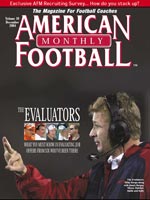AMERICAN FOOTBALL MONTHLY THE #1 RESOURCE FOR FOOTBALL COACHES
Article CategoriesAFM Magazine
|
Fighting AdversityUL Monroe\'s Todd Berry has seen some adversity and risen above itby: W. Keith Roerdink © More from this issue Ask Todd Berry about the coaches who’ve influenced him in his 20-plus years in the business and he’ll rattle off insights obtained from names like John Cooper, Johnny Majors, Steve Logan and even his old high school coach, L.D. Bains. But the one lesson that stood out from all the X’s and O’s and motivational techniques came from his late father, Rueben, a former head coach in the Canadian Football League and longtime mentor to the Saskatchewan Rough Riders: When faced with adversity, relish the chance to overcome it. “That’s probably the greatest lesson that my dad gave me and maybe one of the greatest lessons in life,” Berry said. Berry, coming....The full article can only be seen by subscribers. Subscribe today!
|
|
|||||||
| HOME |
MAGAZINE |
SUBSCRIBE | ONLINE COLUMNISTS | COACHING VIDEOS |
Copyright 2025, AmericanFootballMonthly.com
All Rights Reserved





